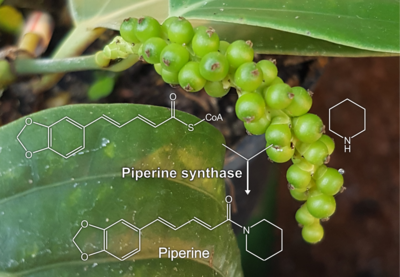On the track of pungency.
The black pepper project at IPB is moving forward with great success. The biochemists of the Department Cell and Metabolic Biology have now succeeded in elucidating the crucial and final step of piperine biosynthesis in black pepper (Piper nigrum). Using a next-generation sequencing approach, they identified an acyltransferase that catalyzes the assembly of piperoyl-CoA and piperidine to piperine. This enzyme, the piperine synthase, is encoded by one gene that is expressed preferentially in immature black pepper fruits. In these immature pepper berries, the Halle scientists also found another enzyme, termed piperamide synthase, which links various CoA esters to aliphatic and aromatic amines with similar efficiency and therefore, displays a promiscuous substrate specificity. Rather than piperine the enzyme preferentially produces piperine isomers in vitro. In addition to identification, expression analysis, and kinetic characterization of these two enzymes were performed, revealing many unusual properties. This research on both acyltransferases will provide future opportunities to produce a variety of medically relevant piperine and piperamide analogs by enzymatic synthesis or by biotechnological approaches in bacteria or yeast. The insights gained could be used to develop enzymes with desired properties. The study was recently published in Communications biology.
Black pepper, since antiquity is a valuable spice and important commodity. Pepper bushes grow as woody climbers on trees up to ten meters high. The spice plant is cultivated not only in its country of origin, India, but also in Vietnam, Indonesia, Brazil and Malaysia. Worldwide, up to 360,000 tons of pepper worth approximately 300-600 million dollar are produced annually. Apart from its use as spice, black pepper is used in traditional and modern medicine due to its digestive and antimicrobial properties. Its major alkaloid, piperine is responsible for its pungent perception. Piperine was first isolated in 1819 by the Danish polymath Hans Christian Ørsted. Although numerous methods for the organic synthesis of piperamides had already been developed, the biosynthesis of piperine had not yet been fully elucidated.



